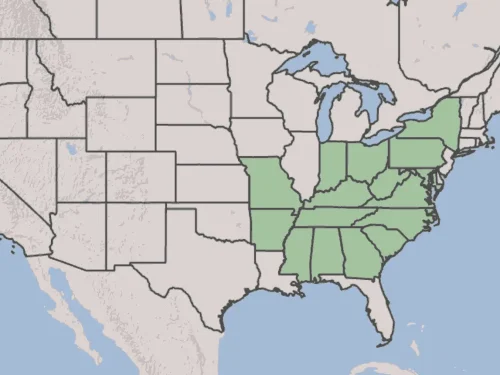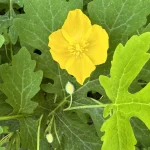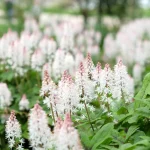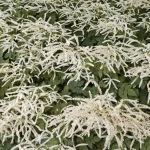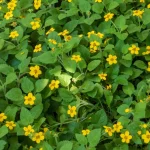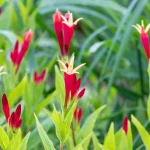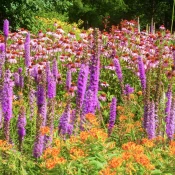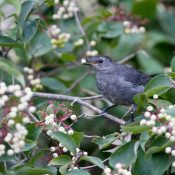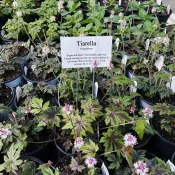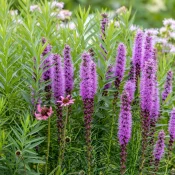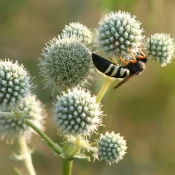Alum Root (Heuchera)
Want some color in your shady garden? This is the plant for you. Alum Root or Heuchera (it goes by a few names) is a short native plant known for its colorful leaf cultivars. They keep their leaves year-round, even in cold climates. Spring brings tall, delicate flower stalks. Heucheras are perfect for shade gardens, super easy to grow, and are easily found at most plant nurseries. Scroll below to find planting tips and a rainbow of heuchera options.
- Part Sun, Full Shade
- Short (under 3')
- Summer flowers
- Easy to find
Heuchera is a native plant beloved for many reasons: it’s resilient and evergreen in most climates, and it has cultivars in almost every shade of the rainbow. In this article, we’ll share its benefits, introduce some color options, and share planting tips.
Let’s start by getting the name right. This plant is known by several names.
Heuchera, alumroot, coral bells—these are all the same plant
This plant has many common names: alum root, alumroot (one word), American alum root, heuchera, and coral bells. On The Plant Native, we’ll call it by its Latin genus name, heuchera. No matter what you call it, it loves to be planted in shade or part-shade gardens.
How do I say heuchera?
It’s pronounced whooo-ker-ah. Imagine you’re a wizened owl from a kids’ movie to get the first sound right (whoooooo likes whoooooo-ker-ah!)
There are many native species—we’re here to focus on two (and their cultivars)
Within the Heuchera genus are quite a few different plants (a genus is a group of plants with species within it.) There are 35 native species of heuchera in North America. The USDA plant directory includes a list of them all. There is even one species native to just Arizona!
In this article, we focus on two plants, which are both called ‘heuchera’ for short. The first is Heuchera americana, and the second is Heuchera villosa. Both of these plants have slightly different native ranges in North America. Both these two plants are where most Crayola-bright heuchera cultivars are derived (more on that in a few paragraphs).
Both heuchera species mentioned have huge native ranges, making them great plant choices for most American and Canadian gardeners:
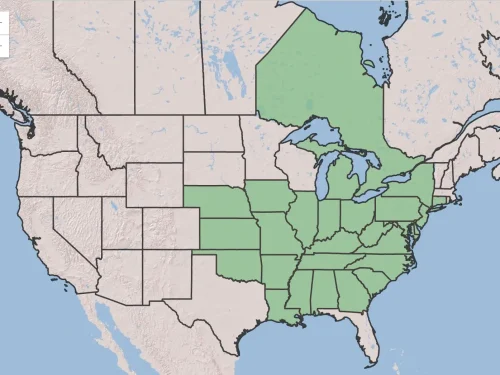
What is Heuchera americana’s native range?
Heuchera americana will grow easily in the Midwest, Mid-Atlantic, some of the Northeast, and most of the South (map from the USDA)
What is Heuchera villosa’s native range?
Heuchera villosa has a slightly smaller range and is found in warmer climates.
Now that we know how to say their name and where they’re from, let’s discuss the many benefits of heuchera.
What are the benefits of planting heuchera?
Heuchera is a native plant that has grown in North America for thousands of years. It’s lived and thrived through every storm, drought, season, etc, in its home area.
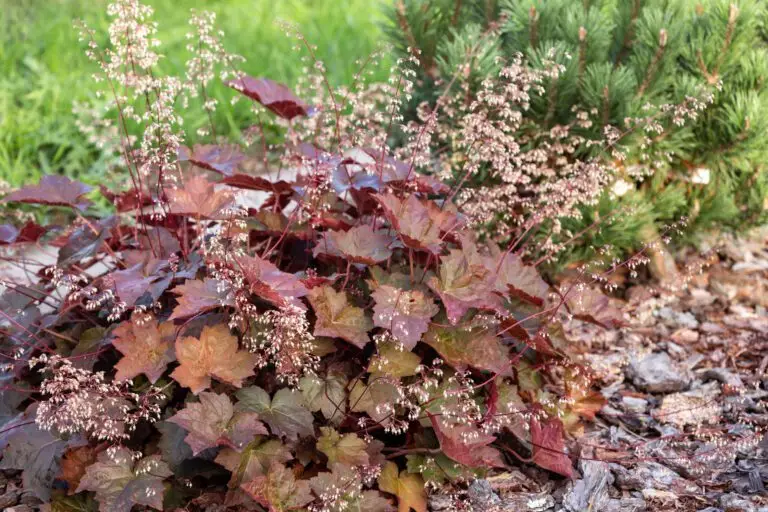
Planting native plants makes our yards and spaces gorgeous while helping the birds, butterflies, and animals (and helping save us time.) Here are a few reasons why planting native plants like heuchera is worth it:
- Wildlife support (and sightings): without native plants, iconic animals like Monarch butterflies and songbirds won’t have the food or homes needed to survive
- Time and money savings: after the first year of getting established, native plants are happy with rain
- Resilient, climate-friendly beauty: heuchera is a perfect example of how beautiful and resilient native plants are—they are always the best choice for our gardens
And a few more benefits to mention…
Heuchera is very easy to grow
Heuchera is a very easy-to-grow shade-loving native plant. No matter the color, all Heucheras share the same basic benefits and characteristics. They are:
- Shade or part-shade lovers
- Mostly evergreen, even in cooler climates
- Short—no taller than 16 inches (don’t put them behind taller things, or they will be hidden!)
- Low maintenance: no fertilizer or special needs are required for heuchera to thrive
- Perennials: they will come back year after year. Once you plant them and they are happily established, you can enjoy them in your yard for years to come.
We’ve covered the basics and benefits. Now, let’s introduce the crayon-box of colors offered by Heuchera cultivars.
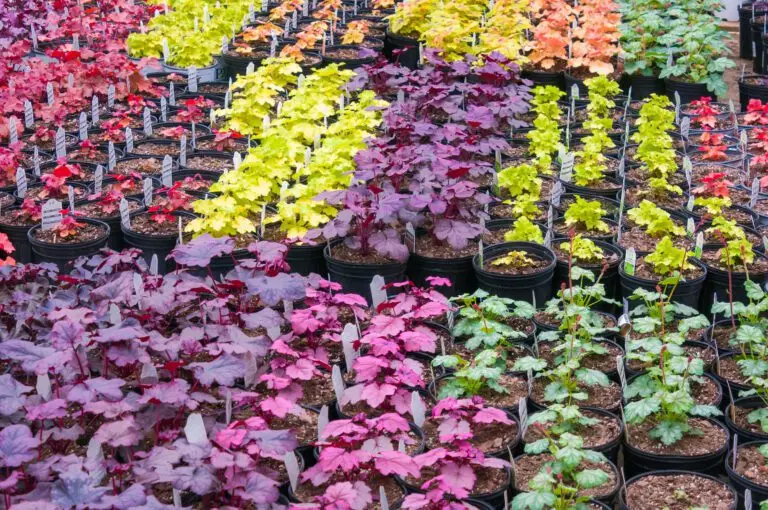
Heuchera cultivars offer a rainbow of leaf colors
It is rare to find the true native Heuchera americana or Heuchera villosa at plant nurseries. The true native species are humble, green-leaved plants that don’t look as showy—and sell as well—as the cultivars.
Over a hundred years of heuchera cultivars
Since the 1800s, heuchera plants have been bred to create a rainbow of cultivars. (Wondering what a cultivar is? Here’s a short cultivar overview.) Most heuchera cultivars come from H. Americana and H. Villosa. According to the native plant experts in Mt. Cuba Gardens, these plants have “lent hardiness, vigor, and important color components to modern hybrids, transforming shade gardens around the world.”
Heuchera cultivars offer different foliage colors and shapes, from deep purple to vibrant orange, red, and yellow, and from round to ruffled, lobed, or deeply cut leaves. Every year, new heuchera cultivars come out.
Let’s meet a few.
Meet some Heuchera cultivars
Here are a few heuchera cultivar options with colors, leaves (and names) that stand out. You’ll know it’s a cultivar when a cheeky name is included in single quotes.
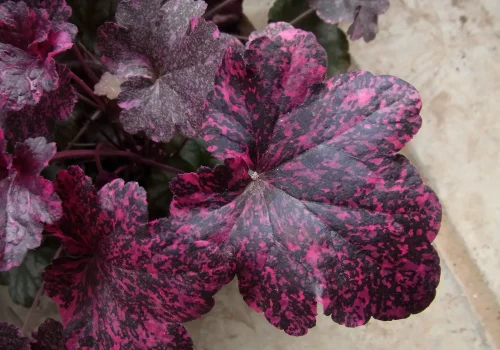
Heuchera ‘Midnight Rose’
Heuchera ‘Midnight Rose’ reminds you of what a Jackson Pollock painting might look like under a black light.

Heuchera ‘Peach Flambé’
Heuchera ‘Peach Flambé’ sounds and looks like a color of nail polish.
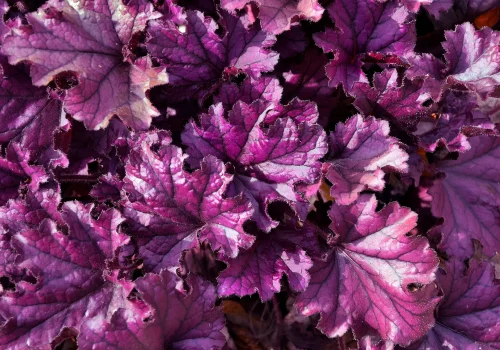
Heuchera ‘Forever Purple’
Plant some Heuchera ‘Forever Purple’ in your yard, and neighbors will not believe it’s real.
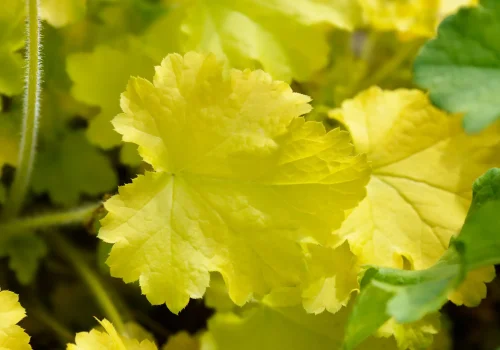
Heuchera ‘Electric Lime’
Heuchera ‘Electric Lime’ does indeed look like a margarita plugged in. Plant this cultivar alongside other green leaf colors to help all nearby plants look extra spectacular.
Which heuchera should you plant?
The answer to this question at The Plant Native is always the same: plant what you love and plant what you find. Sometimes finding a very specific native plant can be difficult. It’s better to visit your local nurseries with an open mind. Oftentimes, what you find is even better than what you had hoped for.
If you’re looking for heuchera cultivars that will do the best in your garden…
Mt. Cuba Center—the largest native plant garden in America—looked at 83 different cultivars and found ten heuchera cultivars that stood out.
According to Mt. Cuba: “After three years of evaluating plant habit, vigor, bloom time, flower color, sun tolerance, pest and disease resistance, and overall adaptability, ten cultivars stood out as top performers.”
These heuchera cultivar stars are: ‘Citronelle’, ‘Bronze Wave’, ‘Cajun Fire’, ‘Color Dream’, ‘Steel City’, ‘Caramel’, ‘Apple Crisp’, ‘Frosted Violet’, ‘Southern Comfort’, and ‘Spellbound’.”
Plant a few, together!
Heuchera cultivars also look great when planted together. The similar heights and rainbow of leaves help their differences shine.
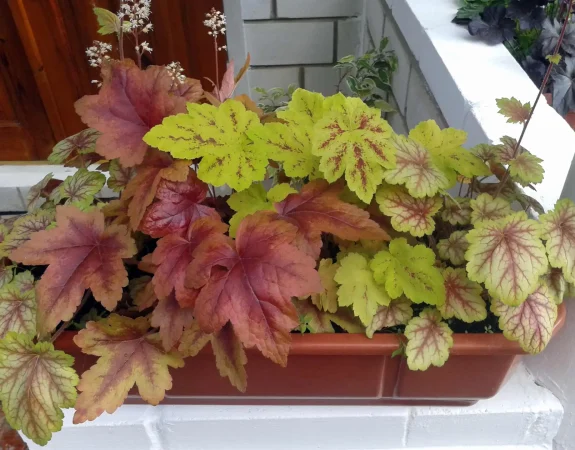
What are some good places to plant heuchera?
Plant heuchera in borders, entryways, containers, and garden edges.
Heuchera are low-lying plants (around 6-16″ tall), so plant them along the edge of your garden to see them shine. (They can disappear behind taller plants.) They work great in front walkways and entryways; their mostly evergreen leaves keep your front door verdant. Heucheras are also great in containers and window boxes.
Here is some landscaping inspo as you plan your native garden:
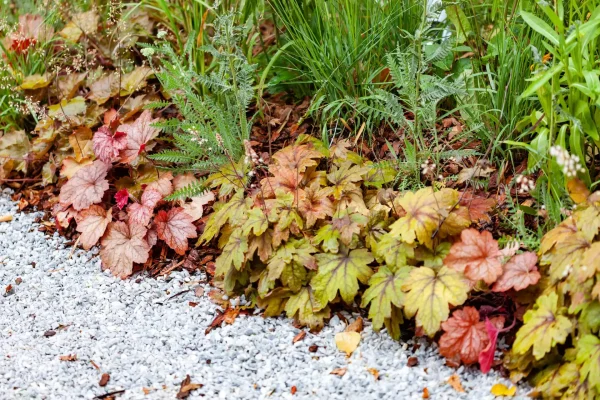
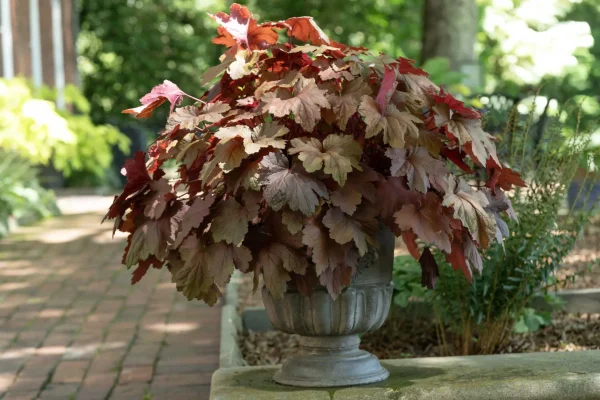
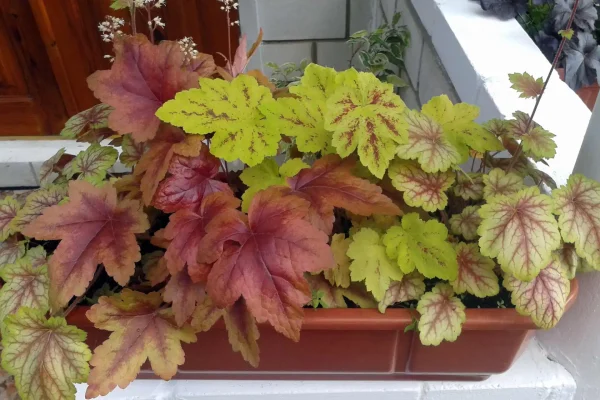
Planting FAQs
When do heuchera bloom?
Is heuchera evergreen—even in the winter?
Heuchera blooms in the spring. Every spring, they have delicate spikes of flowers.
Can I grow heuchera by seed?
Where can I find heuchera seeds online?
Heuchera is easy to grow by seed. You can plant them directly in the garden in the fall or start them in small pots in the spring (replant them in your garden when they are big enough.)
Plant by seed in the fall
To plant heuchera in the fall, scatter seeds and loosely throw mulch or dirt over the seeds. Seedlings will emerge in the spring. (Yes, it really is that easy! Remember, native plants have survived for thousands of years without us and our trowels.)
After the seedlings emerge, water them daily for the first two months to ensure they get enough moisture to grow.
Plant by seed in the spring
In the spring, you can start heuchera outside when the soil is warm 65°F (18°C) — or start plants inside.
Grow seeds outside
Take the seeds individually and plant them into holes 1/8″ deep. Water daily for the first two months to ensure they get enough moisture to grow. Watch the seedlings emerge in the spring, grow greenery that summer, and bloom in future summers.
Start seeds inside
Start heuchera inside in small pots under grow lights. When the danger of frost has passed, move the pots outside to get used to the wind/light/environment (this is called ‘hardening’.) Plant after they have been ‘hardened’ for a week. Water daily for the first two months to ensure they get enough moisture to grow.
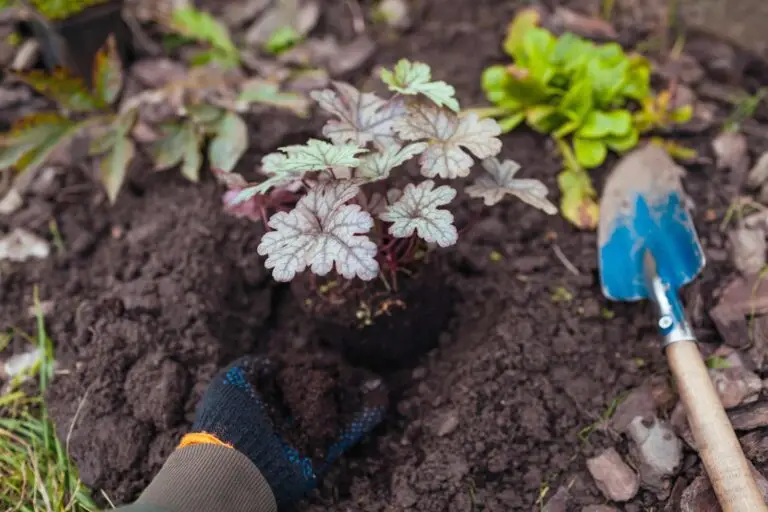
Where can I find heuchera plants?
You can almost always find heuchera at your local plant nursery (and sometimes even at big box stores.) Since they are so easy to grow and so fun to look at, you can consistently find heuchera plants for your garden. Here are ways to find or buy heuchera plants:
Where can I find seeds and plants?
Finding native plants can be challenging (we partly blame Marie Antoinette.) To make it easier, we’ve assembled four sourcing ideas.
Native Nursery List
300+ native nurseries makes finding one a breeze
Online Native Plant Sellers
We've included 100+ online resources to help
Society Plant Sales
Every state has a native plant society; find yours
Online Communities
Local Facebook groups are a great plant source
What pairs well with heuchera?
Heuchera looks great planted alongside other native plants that like shade or part shade, like native azaleas, Celandine Poppy, Golden Alexander, rhododendrons, mountain laurel, Foamflower, and some native shade-loving asters.
Heuchera is perfect for shady gardens
To say it simply: heuchera is a stunning shade-loving plant that looks great year-round, thanks to its semi-evergreen leaves. Dozens of leaf colors come from a stream of fun cultivars making it easy to bring color and excitement to your native garden. Enjoy building a crayon box in your shade garden, filled with heuchera colors. Looking for other iconic shade-friendly natives? Visit our Beginner’s Guide to Native Azaleas or our Beginner’s Guide to Native Rhododendrons. Happy planting!
Sources
- Holm, Heather. Pollinators of Native Plants. (2014), 88.
- Johnson, Lorraine. 100 Easy-to-Grow Native Plants for American Gardens in Temperate Zones. (1999), 101.
- Harstad, Carolyn. Go Native! Gardening with Native Plants and Wildflowers in the Lower Midwest. (1999), 209-210.
- Mt. Cuba Center. “Heuchera Trials.” https://mtcubacenter.org/trials/heuchera/.
- Mt. Cuba Center. Heuchera Trials: A Comprehensive Evaluation of Heuchera Cultivars. 2021. https://issuu.com/mtcuba/docs/heuchera_report
There are plenty of options for shade.
